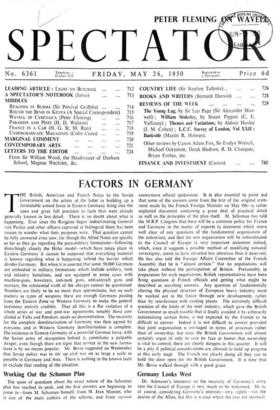Germany Looks West
Dr. Adenauer's insistence on the necessity of Germany's entry into the Council of Europe is very much to be welcomed. He is, of course, considering Germany's interests—very rightly—not the desires of the Allies, but this is a case where the two are identical. The criticisms by Dr. Schumacher, who seems to get less and less constructive every time he speaks, appear to represent most, but not quite the whole, of his party. The attitude of the Allies towards Germany was accurately defined by Mr. McCloy at Hanover on Monday. It was, said the High Commissioner, the aim of the Western Powers to assist Germany to find democratic unity under a free Government, freely elected, and he added that it was no longer a case of conquest and collaboration, but of co-operation and unity, because the future of Europe was at stake." That is so true as to be almost elementary, but it is equally true that as Germany works her way back to full equality with the rest of the nations of Western Europe certain strains and tensions must inevit- ably arise. There will always be a party in Germany anxious to shake off all controls prematurely ; there will always be some elements in France, and perhaps in other Allied countries, unduly suspicious of German motives and possible German policy. Allied occupation is fortunately not a difficulty, for few Germans desire to see the Allied troops removed while the international situation con- tinues as it is. It is worth remembering, moreover, that while Ger- many is being urged from this side to join the Council of Europe, many Germans criticise what they consider the lukewarm attitude of this country towards that body. The impression is largely unjustified, and it is worth while going to some pains to dispel it, for a full détente between Germany and the rest of Western Europe is more likely to be attained on the floor of the Assembly Hall at Strasbourg than anywhere else.







































